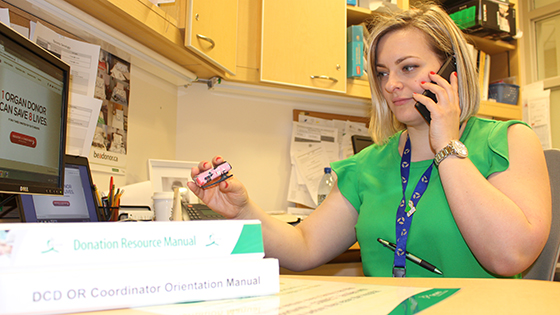
Organ and Tissue Donation Coordinator, Cassandra Paluch, responds to a page that might require her to spring into action to help coordinate organ donation from TWH. (Photo: UHN)
One organ donor can save up to eight lives and help another 75 with tissue donation.
This is why having an updated donor card is so important. Residents of Ontario who renew or update their health card are also asked to fill out an organ donation form to make their wishes known.
But what happens when a patient in critical or palliative care who will not recover from his or her illness doesn't have a clear indication of whether they would be an organ donor?
This is where Cassandra Paluch, Organ and Tissue Donation Coordinator at UHN and based at Toronto Western Hospital (TWH) comes in. Paluch has the delicate task of approaching families when their loved one has been assessed as suffering cardiac or brain death to consider organ donation – a very emotional but time-sensitive process that could result in helping a potential recipient in need of an organ.
Related to this story
"It is definitely a challenging role," says Paluch. "I am connecting with a patient's family on one of the worst days of their lives to help them make a decision quickly, but organ donation has the potential to do so much good makes so it makes the intense work worthwhile."
There is a limited amount of time after the death of a patient has been declared that organs can be recovered for donation. Either brain death or cardiac death can occur, each requiring different protocols when considering organ donation.
National Organ and Tissue Donation Awareness Week 2016
April 17 – April 23, 2016
It's important that the patient's family, who is making the donation on their loved one's behalf, be fully informed and involved in the process. Paluch and her team are specially trained to navigate this situation.
"As coordinators, we have to feel our way through the process of how best to talk to the families," she says. "No two cases are alike and many emotions are involved. My role is to act as a resource and support to the family and also help them see they have a unique opportunity for their loved one to leave a kind of legacy."
Should a family consent to donate their loved one's organs, the next 48 hours are crucial. A multidisciplinary team begins the intensive work to recover the organs designated for donation, maintain them, and find an eligible recipient in time. The patient's family also has the right to change their minds about the donation at any time.
In this phase, Paluch acts as a liaison between all the different services to assess organ suitability at the hospital, the Trillium Gift of Life Network (TGLN), and the provincial resource centre for organ donation at TGLN. She also ensures the family is kept up to date and receiving any support they may need.
"Being in this role has really shown me that out of very tragic circumstances, there is hope," says Paluch. "With organ donation, life doesn't stop at the death of a patient, but actually fosters a continuation of that patient's life."
She points to Ralph Walker, a
burn survivor who sustained burns to over 90 per cent of his body in 2007. Walker's chances of survival at the time of his accident were very slim, but thanks to skin grafts made possible through tissue donation, he recovered and has been able to live as close to a normal life as possible.
Walker will be giving a talk about his experience as a TGLN tissue recipient to staff in the TWH auditorium on April 18th.
"Our team is acutely aware of how many people can be helped through organ donation which is why coordinators put their heart and soul into this work," says Paluch. "But we rarely get to hear about the outcome of that work and so I'm looking forward to hearing Ralph's presentation as to how much organ and tissue donation can make a difference."
National Organ and Tissue Awareness Week runs from April 18 – 22. TWH, TGH and PMH are hosting awareness booths throughout the week. Staff and visitors can register to be an organ and tissue donor at these booths, providing they have their health card number. Find out more here.
